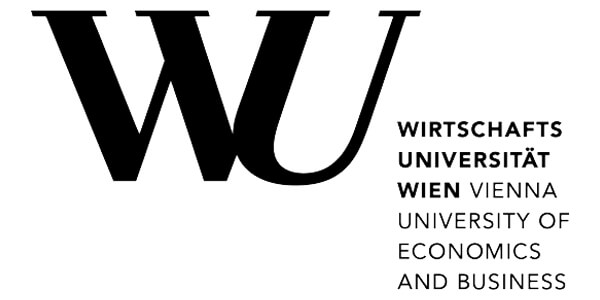Quantitative Finance
- Abschluss: Master of Science (M. Sc.)
- Umfang: 4 Semesters, 120 ECTS Punkte
- Studienart: Präsenzstudium, Vollzeit
- Bildungsfeld: Wirtschaft & Management
- Unterrichtssprache: Englisch
- Website: www.wu.ac.at

The Master Quantitative Finance will provide you with an excellent academic and practical education to become an expert in financial methodology. It is your ideal starting point for a future career in today’s challenging and dynamic financial markets.
The well-balanced curriculum builds strong quantitative skills combined with a solid knowledge base of the underlying theory of finance. Students acquire the necessary knowledge and skills to use mathematical models to understand complex financial problems.
A special focus lies on using the software ‚R‘, an open source implementation of the language S for data analysis and visualisation. Students benefit from the expertise of the programs‘ faculty, which is strongly involved in the international development community of R.
2
TRACKS
Specialize in Science or Industry
The Science Track prepares students for an academic career in the field of finance, while the Industry Track focuses on a career as quants (analysts) in the finance industry, combining financial models with computational skills. You can specialize in the second year of your studies. In both tracks you will benefit from working together with our experienced faculty and from their strong academic networks and links to the finance industry.
80%
INTERNATIONAL STUDENTS
A truly international program
The Master Quantitative Finance attracts students from many places around the world which gives you the chance to experience a unique educational culture. The courses of the program have an international orientation and provide all the necessary knowledge and skills to start an international career.
60
PLACES PER ACADEMIC YEAR
An exclusive, high-quality post-graduate education
Only the best applicants can join the program. An important part is learning in small groups which offers many possibilities to be in contact with and get support from the faculty – both inside and outside the classroom.
Structure & Content
Over the course of studies, students acquire theoretical as well as practical knowledge and skills to comprehend and apply mathematical models on complex financial problems.
The Master Quantitative Finance is a full-time program which takes 4 semesters.
Here you find further information.
Application & Admission
To succeed in this challenging program, we expect participants to have had extensive training at undergraduate level in the fields of linear algebra (e.g. eigenvectors and eigenvalues), analysis (including multivariable calculus and simple ODEs), and probability (e.g. conditional expectation).
Here you find further information.
Career Prospects
Graduates of the Master Quantitative Finance are qualified to be tomorrow’s experts in the increasingly complex world of finance, e.g. in:
- asset management
- credit and market risk management
- treasury and trading
- financial engineering
- research and technical analysis
- corporate finance
Graduates also qualify for a relevant Doctoral or PhD program. Students who want to pursue an academic career are strongly encouraged to choose the Science Track to be well qualified.
Qualification profile
After completing the program, graduates will be able to
- understand and analyze complex financial problems using mathematical and statistical models;
- use mathematical and statistical methods and computational procedures for financial decision-making;
- make effective use of the relevant academic literature;
- know how to handle financial market data and information systems in theory and practice;
- work well in teams and participate actively in problem-solving processes.
Within the program, students can shape their own education by choosing either the Science Track or the Industry Track.
Graduates of the Science Track have also the knowledge and skills to
- grasp, analyze and discuss current scientific publications in the field of finance;
- research, write and present academic papers;
- further deepen and broaden their specialized knowledge in a relevant PhD program.
Graduates of the Industry Track have also the knowledge and skills to
- evaluate and analyze risks of financial instruments using current models and methods, and analyze financial time series;
- develop and apply computational processes for solving finance-related problems;
- translate theory into practical decision-making.
UNI-Profil
Wirtschaftsuniversität Wien
Welthandelsplatz 1, 1020 Wien
Telefon: 01 313 36-0 Website: www.wu.ac.at
